Erstellt am: 29. 11. 2013 - 11:41 Uhr
Caught between East and West
Today is the second and final day of a major EU Eastern Partnership summit in Vilnius, Lithuania, a trade meeting with several former Soviet satellite nations, including Ukraine, Georgia, Azerbaijan and Moldova.
It`s meant to be about prosperity but it has become characterised as a tug of war over spheres of influence between Brussels and Moscow.
“I`m very optimistic about this summit," Moldovan social worker Veronica Timbalari told me earlier this month. Her country, officially the poorest in Europe, is set to initial an "Association Agreement" - a deal aimed at promoting at economic co-operation and also democratic values. It is seen as a key step on the long journey to a possible EU membership.
The dream may seem distant but the first steps could be significant in Moldova. "Our country has a very hard working people and good land," says Timbalari. "We just need some investment and some help.”
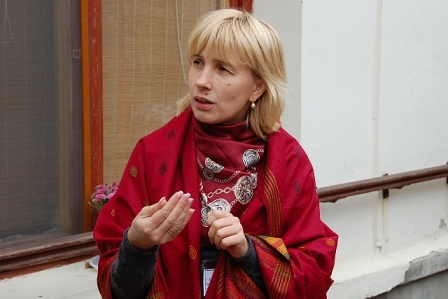
ada
Wicher Slagter, the head of the EU delegation to Moldova, says this will be a significant moment: “It means the EU market, more than 500 million consumers, will be fully opened to Moldova and that will be a big boost to the Moldovan economy.” Schlagter predicts the move will lead to the “modernisation of the country.”
But Timbalari, like most Moldovans, realises that the pro-Western stance will come at a cost. Moscow had hoped Moldova and Ukraine would join its rival free market Customs Union project rather than turning towards the European Union.
As Brussels dangled the carrot of freetrade benefits, Moscow started using its stick.
In September it banned Moldovan wine imports, arguing that they did not meet quality standards. But many, including Slagter, suspect the ban was a retaliation for Moldova’s flirtation with Brussels: “We have made it very clear that this kind of blackmail is unacceptable,” says Slagter. “This is not the way countries should deal with each other.”
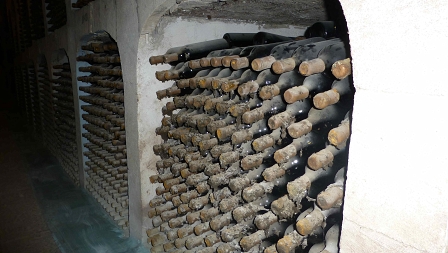
chris cummins
The pressures that Moscow can exert over their lives and livelihoods seem reflected in public opinion. According to a poll carried out last year by the country's Institute of Public Affairs, only 52% support the idea of Moldova joining the EU. "The problem is in the first place that Moldova is rather vulnerable to Russian pressure in terms of trade and labour organisation," says Slagter.
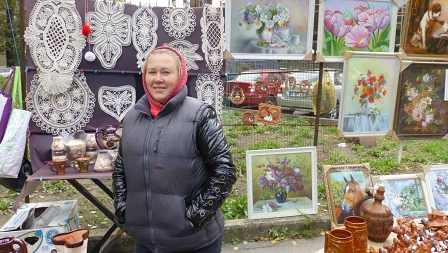
chris cummins
Indeed the current summit in Vilnius has been rocked by a Ukrainian U-turn announced last week - a move interpretated as a victory for Moscow over Brussels.
The government of President Viktor Yanukovich was due to sign a free-trade agreement but, apparently deciding Ukraine had more to lose by annoying Russia that it had to gain by improving ties with the EU, has suspended progress. Yanukovich said the EU was not offering adequate financial aid to upgrade Ukraine's economy.
In Brussels this week an EU official admitted to me that the move had come as a shock and exposed the EU's lack of a coherent policy for dealing with Russia. Tens of thousands of pro-EU demonstrators have demonstrated in Kiev against Yanukovich's move, there are even plans today to make a 650km human chain from Kiev to the border of EU member state Poland, but at the moment Brussels has little to offer them other than the insistance that the door remains open.
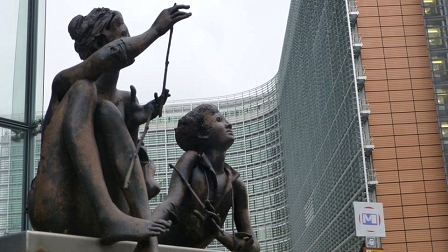
chris cummins
In the Moldovan capital Chisinau there have also been demonstrations for and against the move. But significantly the biggest anti-EU rally, organised by the Communist Party, is estimated to have attracted 15,000 people while earlier this month 100,000 people gathered at a rally to pledge support for the pro-west policies of the government.
It is a worrying situation for Moldova to be caught in the middle of a battle over spheres of influence.
On the one hand, Moldova desperately needs the economic benefits and modernisation that Brussels is promising, but on the other hand its economic fragility makes it very difficult to absorb the shock-waves of any retaliation from Moscow.
“We are not a piece on some giant chessboard.”, complained Moldovan Prime Minister Iurie Leanca this week.
Moldova's fragility is evident on the bumpy road to small town of Straseni. The road is lined with the empty shells of abandoned Soviet-era factories and the former workers face a bleak retirement. It is here where Veronica Timbalari works, offering a safety net for a few hundred elderly Moldovans. But she says thousands more would need help: “The average pension is nearly 50 euros, in the villages it is less, and the minimum basket of existence is more than 100 euros per month”
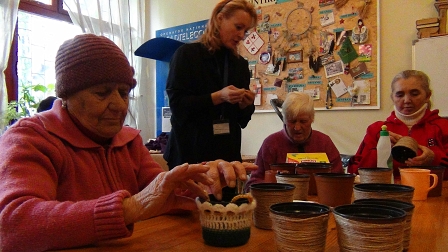
chris cummins
A lot of houses in the village have no electricity, they use gas lamps. They have no water supply so they have to use buckets of water.” Her charity can help around 250 of the neediest, but she says that is a drop in the ocean and deciding the cut-off is “heart-wrenching.”
This desolate situation could be seen as an example of why Moldova urgently needs the benefits and investment promised by Brussels, but Timbalari says many older Moldovans favour better relations with the East. It`s not just "bullying" from Putin but a genuine nostalgia from the past. But Timbalari feels this is misguided: "It's because they have this old mentality with old memories from the old Soviet times when everybody was equal and everyone had salaries and pensions.”
In late Autumn, it is already biting cold in Moldova. There have been veiled threats that by initialing the trade agreement in Vilnius, Moldova might endanger its gas supply from Russia. It is easy to understand why these threats are taken seriously.
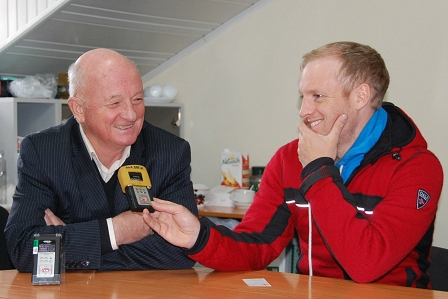
mauela gutenbrunner
Whatever happens in Vilnius, a veteran political analyst Oazu Nantoi insits westernizing means much more than just initialing an EU agreement. ”We have a problem with corruption and with our justice,” he scoffs,” and so it is nonsense to discuss the investment climate.” Moldova ranked a lowly 94 of least corrupt nations in Transparency International`s 2012 Corruption Perception Index.
Like many other issues in Moldova, critics have linked this vulnerabilty to corruption to the legacy of the Soviet era. In those days, says Diana Railean, the editor of Radio Europa Libera, Moldovans feared the state and didn’t dare report incidents of corruption: “So now people do have a freedom of speech but they don’t know how to use it. You are not going to see people going on the street saying we don’t want corruption anymore:”
Then there is the unresolved future of the breakaway territory of Transnistria, a mini-regime which unilaterally proclaimed its independence from Moldova two decades ago. An internationally unrecognised and anachronistic regime, Transnistria sports the hammer and sickle on its flag and has declared hopes to join Russia.
Oazu Nantoi fears that the negative international headlines over this “frozen conflict” are hampering any serious development.
Faced with such poverty, a third of Moldovans of working age have left the country looking for work and a better life abroad. Parents often leave children to be raised by grandparents and Gabrielle Damian, the director of Moldova's Professional Capacity Institute, says this brain drain is one of the greatest threats to social stability. “The young generation is left at home without their parents and without a decent family life and without having prospects for their future.”
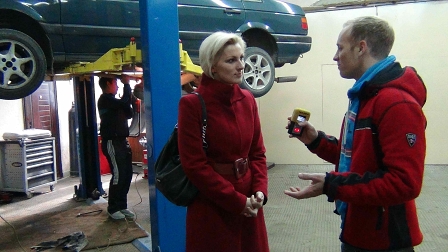
Manuela Gutenbrunner
The Austrian Development Agency has been supporting vocational schools in Moldova, trying to help young people gain the skills that would enable them to stay and build up their country from within. I visited a school in Chisinau where teenagers and young men and women are learning stone masonry, how to wire electricity, how to repair cars.
“I'm optimistic when I meet these young people. I see they are enthusiastic, they are committed, they would like to build a life here at home," says Damian "They would not want to replicate their own childhoods when their parents migrated. So I think a time for a change has come. “
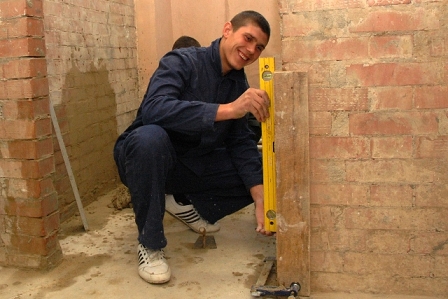
ADA
One Moldovan who has decided to stay is radio journalist Daniel Voda. He accepts that the economonic situation is fairly bleak right now, but he hopes that recent freetrade agreements with the European Union will bring new investment and hope to his country, so that it can escape its ranking as the poorest country in Europe:
"Let's imagine that everyone will leave and then what? Someone just turn off the lights?" he asks. "Somebody needs to change that rating. Someone needs to push the country ahead. Nothing is impossible when you have enough desire."
"It's not seeing things with rose-tinted glasses," he argues, "it is being pragmatic and seeing the situation as it really is and working on it.”
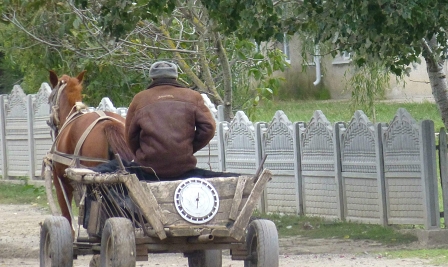
chris cummins
Voda says the Russian threats will backfire. He compares geopolitical battles to the politics of a school playground:
“If you have two friends and one is being nice, polite, welcoming and friendly you will like that person more than someone who is bullying you all the time. So that's why the decision of being part of the European Union is way better for a lot of Moldovans."


